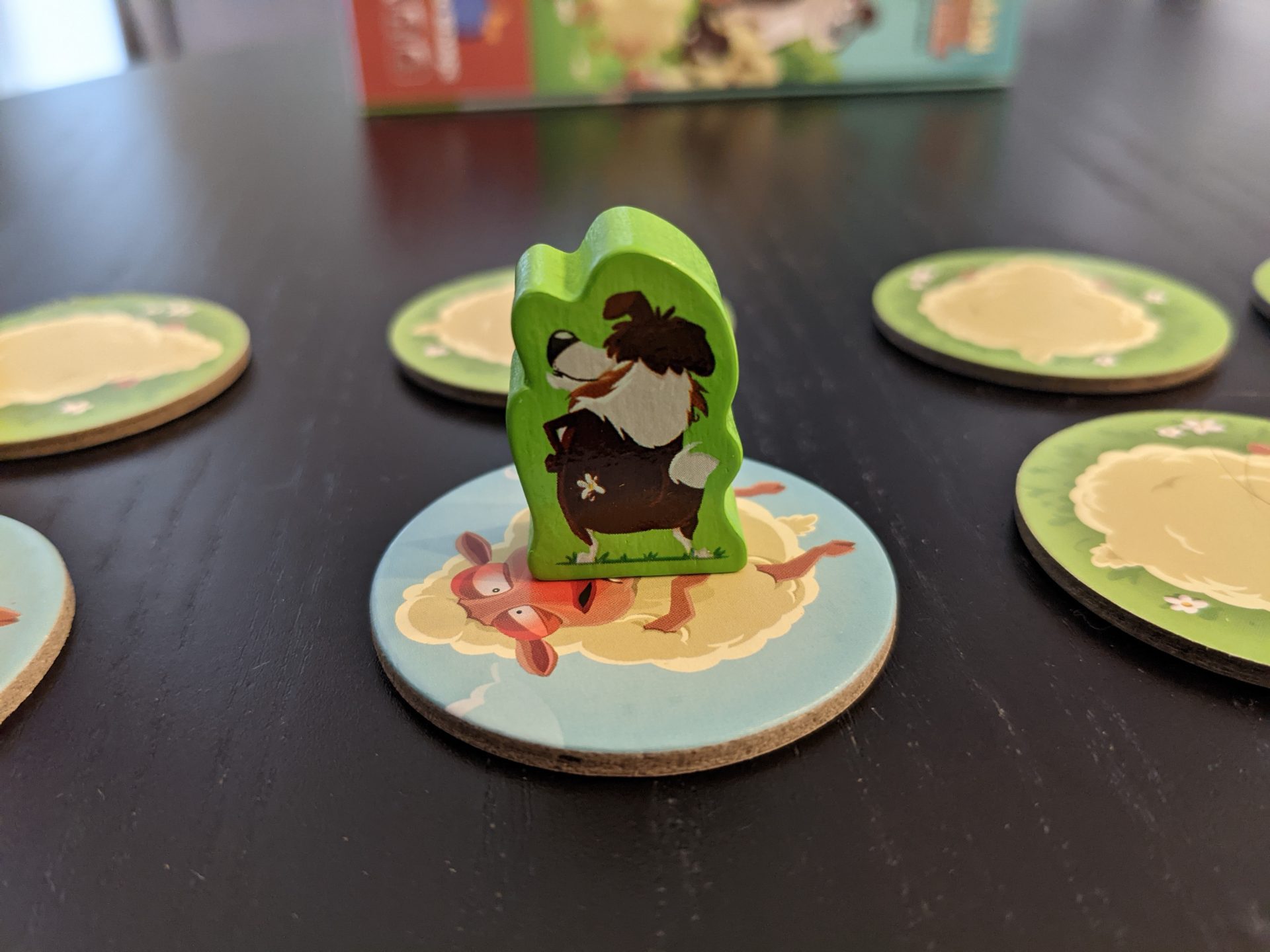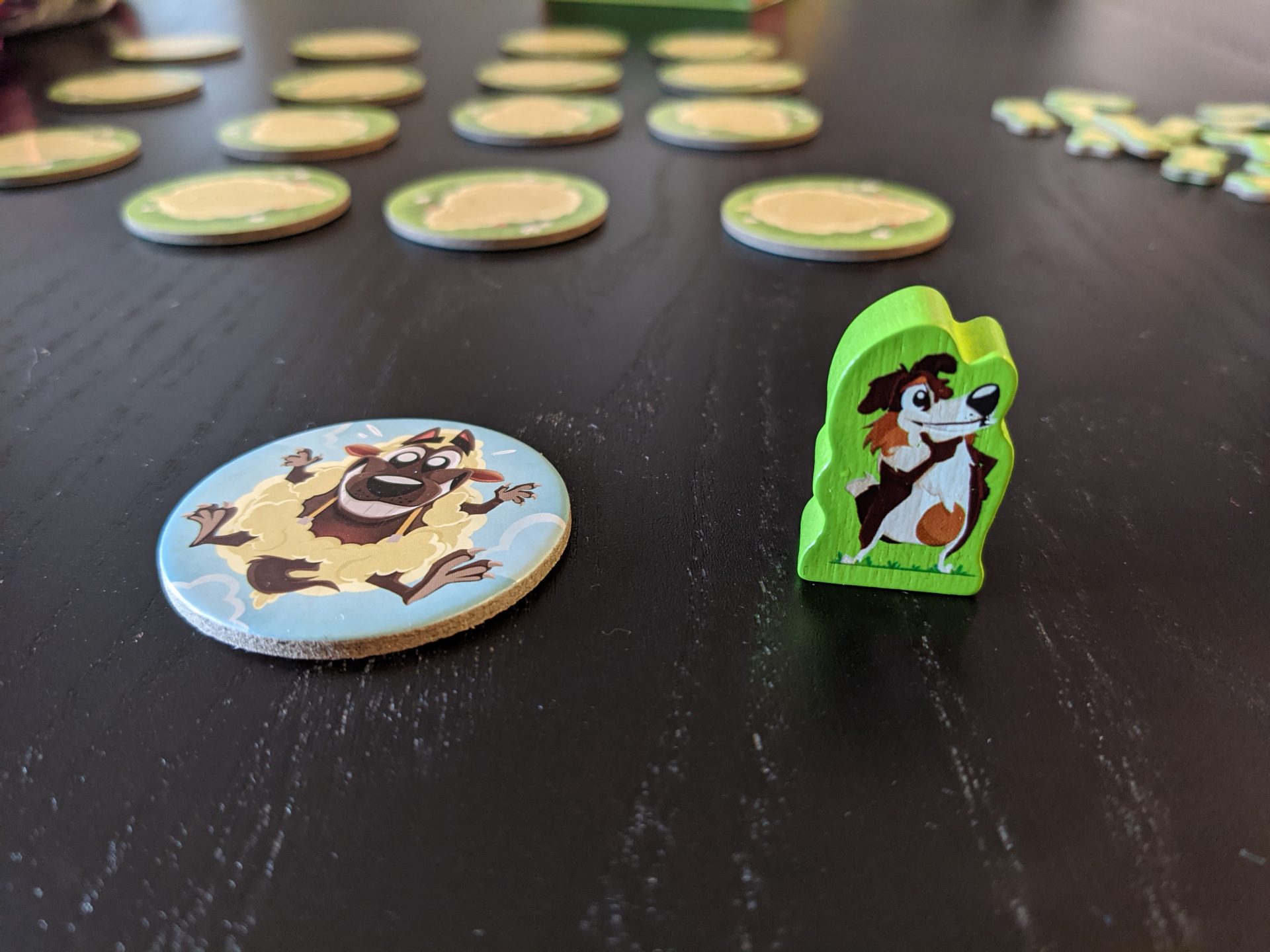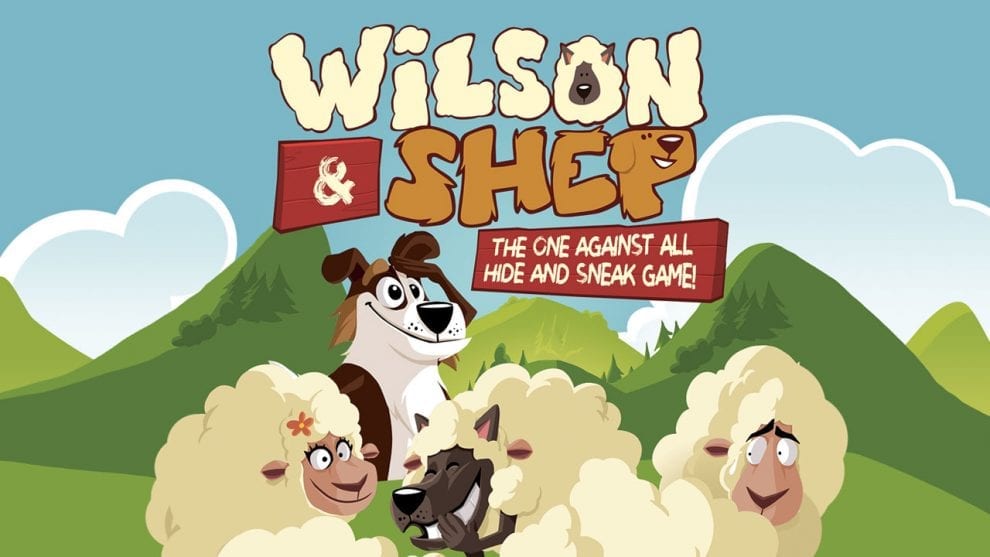Disclosure: Meeple Mountain received a free copy of this product in exchange for an honest, unbiased review. This review is not intended to be an endorsement.
Four plays in, one thing is clear: Wilson & Shep, by Blue Orange Games, is tough.
That’s not because it is difficult to learn; in fact, the rules for Wilson & Shep are very straightforward. But in practice, it’s really, really hard to find that crafty Wilson hiding amongst a flock of 16 sheep, especially when one of the adults playing the game is crafty enough to keep Wilson just out of reach from the other players.
The question I keep asking myself: should a family game feature a search function that is so difficult?

Wilson? I liked him better as a volleyball
The set up for Wilson & Shep is incredibly straightforward. One player is playing as Wilson, a mischievous wolf who will hide amongst a flock of 16 sheep tiles on the board. All other players—the game supports up to six total players—work together as Shep, a sheepdog whose only purpose in life is to find Wilson.
To set up each round, the active Wilson player places all 16 regular sheep tiles in a 4×4 grid on your game table. Then, after asking all of the Shep players to close their eyes, the Wilson player places the Wilson tile—one side has Wilson, the other has a sheep picture identical to the other 16 sheep tiles—in any of the spots where the other sheep reside.
Then, after Wilson asks the Shep players to open their eyes, team Shep collectively decides where to place the Shep standee and start flipping tiles to see if they have found Wilson. If they find Wilson on that first try, great: all players who were responsible for finding Wilson get a point token, and then the Wilson role rotates to the player sitting to the left of the current Wilson player (or simply alternates to the other player in a two-player game).
If Wilson has not been found—the much more likely scenario, in our experiences—then all Shep players close their eyes again and Wilson may swap any two adjacent tiles, including any tiles that have already been flipped (although the tile Shep is standing on cannot be moved). In the spirit of misdirection, Wilson might simply swap two tiles that don’t include the hidden Wilson tile. Or, Wilson might just tussle two tiles to make it sound as if Wilson might be underfoot, even if Wilson hasn’t moved at all. (The rulebook even suggests this tactic as a way to throw off players, which is amusing if you are playing as Wilson. For the Shep players? Not at all!)
Play continues for up to eight turns until the Shep players find Wilson. If Shep can’t find Wilson, Wilson wins the round and gets a point token. Then play continues to the left, until everyone has been Wilson at least twice, or more at a higher player count.
So, the rules are simple. But it is SO tough to find Wilson. That’s not because the game’s rules make it hard. It’s because Wilson simply has a major advantage all game long. Even as Shep turns over more and more tiles, Wilson can almost always move out of Shep’s way because Shep can only ever search the tiles immediately adjacent or diagonal to his current position. If the Wilson player can stay out of Shep’s range, it becomes impossible to catch him. In fact, a few times while playing this game, Wilson was able to win a round by the sixth or seventh action, if Shep was 2+ tiles away from Wilson, because Shep can only move one space with each action.
“Daddy…this game is hard,” my seven-year-old complained. “Maybe you can just give me a hint if I’m close to Wilson, so that I can find him?”
We don’t like to cheat the rules at the Bell household but in the case of Wilson & Shep, we considered it multiple times.
Another strange fact about Wilson & Shep? It plays up to six players, but we never wanted to play it at more than three. Even at three, two Shep players at a time have to work together to decide something that they literally do not know. Groupthink is not a winner when it comes to deduction in a game of Wilson & Shep.
“We could pick that spot in the corner,” my wife would say when we were working together against my daughter’s Wilson.
“Maybe. But I thought I heard some shuffling with that spot just to the left of Shep.”
“OK, you pick.”
“No, you pick.”
And on and on. Of course, with only 3-4 sheep tiles flipped, neither one of us had any real idea where Wilson was. It’s not like Wilson or his movements drop evidence for the Shep players. You are just guessing.
So that makes for an interesting conundrum: is this the kind of experience you want to provide to a child?

It’s Your Life, But My Vote is No
Based solely on my experiences with Kingdomino, Photosynthesis and the new release Paco’s Party, it’s clear that Blue Orange Games knows games and I believe they understand the dynamics of how families absorb casual content and how games work for all ages.
But Wilson & Shep didn’t do it for my family. I know that because my kids wouldn’t ask to play it when faced with choices of the other family games we are playing this month. My four-year-old son—who is outside of the recommended age range for the game, but we always run all games by both kids just to see if they will fit—enjoyed flipping over the tiles to see if Wilson was there, but couldn’t grasp the strategy behind how to move Shep around the board to try and find Wilson.
And even my seven-year-old recognized when luck was a factor in the pick. In the few instances when someone found Wilson, we found Wilson on the very first turn of a round; in other words, when we just got lucky and placed Shep on one of 16 random tiles and found the wolf. Usually, we didn’t find Wilson at all; discouraging, to say the least, but also a bit of a slog, because having to spend eight turns coming up empty each time is disappointing.
While the gameplay of Wilson & Shep didn’t work for our family, the quality of the Blue Orange production process is once again excellent. Love the magnet-close seal on the box. Love the artwork of the sheep. The Shep playing piece is great. And the rules are very well written.
But, as good as the fully-realized product feels in your hands, it doesn’t make Wilson & Shep any more playable. I’m sure there are tweaks to the rules that would make this work better—Shep brings a friend or two, and you have less turns to find Wilson, to start—but as is, this one wasn’t as good as we hoped.












Add Comment